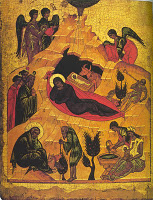 I heard something about Apollinaris recently that was new to me (at least I don’t remember hearing it before). A lecturer said that Apollinaris reasoned that two perfect natures could not be joined. Sure enough, the Catholic Encyclopedia agrees:
I heard something about Apollinaris recently that was new to me (at least I don’t remember hearing it before). A lecturer said that Apollinaris reasoned that two perfect natures could not be joined. Sure enough, the Catholic Encyclopedia agrees:
Ontologically, it appeared to him that the union of complete God with complete man could not be more than a juxtaposition or collocation. Two perfect beings with all their attributes, he argued, cannot be one. They are at most an incongruous compound, not unlike the monsters of mythology. Inasmuch as the Nicene faith forbade him to belittle the Logos, as Arius had done, he forthwith proceeded to maim the humanity of Christ, and divest it of its noblest attribute, and this, he claimed, for the sake of true Unity and veritable Incarnation.
Appolinaris’ logic would, I think, do more than problematize the incarnation.
In creation, God voluntarily decided to make something new. Did he have to do so? Did he need something new or did he need to change in some way?
As a theist, I answer no.
God created out of grace. God was already a community of love — Father, Son, and Holy Spirit — without any need for community or fellowship to be provided by creation. But out of that overflowing love, God decided out of his good pleasure to share himself.
I can see how this seems impossible. If God is a perfect and complete nature, why should he be motivated to add creation to his environment? But I do think we have to insist that God was both complete and perfect in himself, and yet also was able to be willing to make something new in order to share the joy within the Trinity with creatures.
So, on God’s side, a perfect nature can join with another at the level of creation. I’m not sure it really is more problematic, once you have taken that step, to admit he might do the same in the incarnation. Incarnation is qualitatively “more” than creation, but I think the same logic still applies.
And what about humanity?
I’m not sure what freight was included in the word “perfect” in Apollinaris’ day. I think a baby is perfect. Maybe Apollinaris would disagree. Maybe he would say a baby is perfected by growing to adulthood. In that case, maybe no human nature is really perfect. Maybe all await completion at a future date and state.
What if humanity was always intended to be joined to God? The special instance would be Jesus himself as the incarnation, and then in him and through him we are all joined to God through this new head of the human race. Being joined to God in hypostatic union was not a violation of his complete nature, but a consummation of it.
Creation was always meant to be God’s dwelling place, and Jesus fulfilled creation’s mission.

